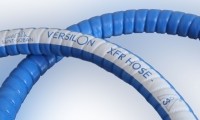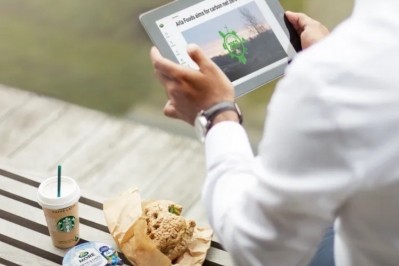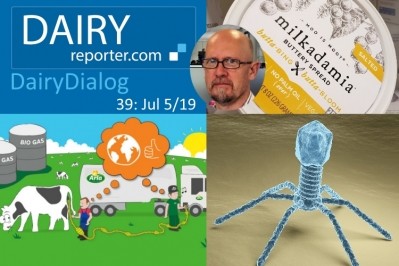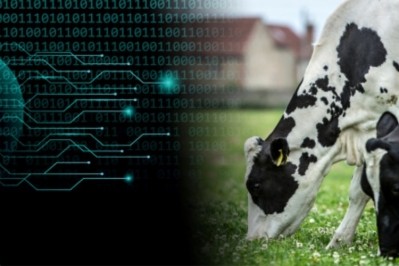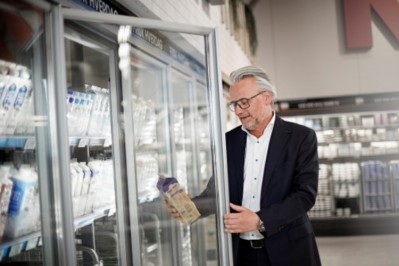Dairy Dialog podcast 41: Arla UK, Send a Cow Rwanda and Saint-Gobain
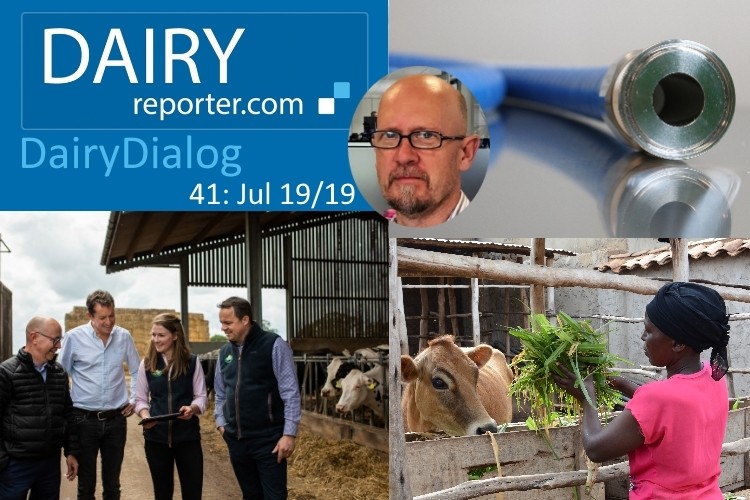
First, we talk to Arthur Fearnell, elected Arla Board member and one of the Arla farmer owners trialing some new technology designed to improve cow welfare.
We then speak with Andre Nsengiyumva, country director for Send a Cow Rwanda & Burundi, about the program helping local farmers through Jersey cows.
Then we chat with Dan Meyer, from Saint-Gobain, which has launched Versilon XFR, an extra-flexible and lightweight suction and discharge hose designed for food and beverage transfer applications.
And we also have our weekly look at the global dairy markets with Liam Fenton, from INTL FCStone.
Arla UK 360 farmers to trial industry-first 3D scanning systems to improve cow welfare
Arla, the UK’s largest dairy cooperative, is launching a 3D scanning tech trial it hopes will help its farmer-owners identify changes in their cow’s physical wellbeing, mobility and weight, even before they are visible to the human eye.
The technology, Herdvision, has been developed by Kingshay working in partnership with the Centre for Machine Vision in the Bristol Robotics Lab at the University of the West of England, and AgsenZe.
Herdvision takes measurements that currently have to be made subjectively by the human eye, using visual monitoring, data recording and automated intelligence to help manage cow welfare.
Arthur Fearnell, elected Arla Board member and one of the Arla farmer owners currently transitioning to Arla UK’s 360 programme with the support of retailer Morrisons, said, “Technology has moved on so much in the last decade and it is providing new opportunities to further enhance animal health on farm.
“The systems Arla UK 360 farmers are now trialing give a picture of each individual animal’s health that humans alone could only dream of seeing. Identifying early signs of change can have a positive impact across the board, from overall cow well-being, to better milk production, a reduced need for medication and increased fertility rates.”
If trials are successful, the automation of monitoring body conditioning, mobility and herd health could provide a component for Arla’s Happy Cow measure, Arla’s vision for using future technology to bring together physical and behavioral well-being metrics into one overall picture of animal wellbeing.
The trial has been welcomed by UK retailers Morrisons, which is supporting the Arla UK 360 programme across its entire Arla milk supply.
Sophie Throup, senior agriculture manager at Morrisons, said, "Technology and innovations opening up further improvements in the health and welfare of livestock are exciting. Having organized trials for these tools to help Arla UK 360 farmers enhance their already leading standards is encouraging and a further demonstration of why we wanted to adopt the 360 standards in full for the farms who supply us. Our customers care about animal welfare, so to know that these trials can improve the well-being of the animals supplying their milk is reassuring.”
Graham Wilkinson, agricultural director of Arla Foods, said, “Arla farmers are already in tune with the well-being of their cows, but digital advances in farming bring the opportunity to revolutionize cow health management. When we launched Arla UK 360 we set out a vision to bring together physical and behavioral well-being monitoring to create the Happy Cow measure. The Herdvision technology could be a game-changer in automating the measurement of the physical components to deliver this.”
While there are already other scanning technologies, the new Herdvision technology doesn’t require the cow to stand still, meaning it is easier to use and gives much greater accuracy in the results.
Duncan Forbes, dairy research director of Kingshay, said, “Much like humans reacting differently if we know there is a camera filming us, cows do the same. Studies show that cows behave differently if they think they are being watched, affecting the way they walk or move.
It is ingrained primitive behavior not to show weakness and even though cows have been domesticated for thousands of years, the mindset of best foot forward still seems prevalent in today’s animals. Overcoming that issue, and with artificial intelligence built in, this system will measure and identify changes to cow health based on each individual cow’s own health record.”
The Herdvision scanner is being trialed on ten Arla UK 360 farms. With results being built over time as increased amounts of animal health data is recorded, the trial will continue until an evidence based decision can be made about the proven benefits of the technology.
Jersey cow eradicating hunger and poverty in Rwanda
Jersey cows are not usually associated with international development programs, but in Rwanda, the breed is giving families a sustainable route out of poverty. Where resources are scarce, Jersey bred cows have some real benefits, producing high yields of milk.
The majority of the population in Rwanda depend on small-scale farming for their livelihoods. But because productivity is low, many are living in poverty and 37% of children under five are stunted due to malnutrition.
The Send a Cow program, which introduces Jersey cows to several African countries, is working with Jersey Overseas Aid and The Royal Jersey Agricultural and Horticultural Society, to bring the benefits of the Jersey breed to farmers and their families, across the whole of Rwanda, through the Jersey Inka Nziza project.
With support from Jersey Overseas Aid, Send a Cow is working with 12,000 households in the country to improve dairy cow management and increase milk production to tackle hunger and poverty.
Compared to other international breeds or local Rwandan cattle, Jersey cows require half the amount of fodder to produce the same yields, or higher. A much smaller animal, the Jersey breed is reportedly 69% more tolerant of the climate and heat in Rwanda than other breeds normally favored for dairy production.
Andre Nsengiyumva, country director for Send a Cow Rwanda & Burundi said the impact of the Jersey Inka Nziza project has already been noticeable.
“We’ve seen some very impressive results from the first phase of the project, especially the monthly milk production, which has increased from up to 167 to 247 liters due to better husbandry techniques. This means families can sell some of their cow’s milk to generate an income, pay for vital supplies and send their children to school,” Nsengiyumva said.
“The vast majority of Rwandan farmers involved in the project only have only one or two cows but they provide people with a lifeline – milk and manure to grow vegetables means children don’t grow up stunted. Small scale farmers can now give their children a future free of hunger and afford to give them an education.”
Families in Rwanda are already noticing the difference in their day to day lives and the health of their children.
More than two thirds of the people Send a Cow supports are women. One of the farmers, Jeanette Kanyange, said, “My oldest Jersey bred cow is called ‘The Famous One’! I think that Jersey cows are easier to look after, consume less fodder and produce a better quality and creamier milk than Fresians. My children and nieces and nephews much prefer the Jersey milk, too.”
Families in the region, who live on subsistence agriculture, are able to produce better crops of vegetables from fertilizing the soil with cow manure, but the Jersey bred cows themselves require less feed, freeing up land to be cultivated directly for food.
And by selling surplus farm produce, families’ income often increases six-fold.
Jersey cross-bred cows consume less water per liter of milk produced – making them ideal for Rwandan smallholders. The Jersey Inka Nziza project is working to increase the numbers of cows cross-bred with the Jersey by training artificial insemination technicians, throughout the districts of Rulindo, Kayonza, Rwamagnana and Bugesera.
Send a Cow currently works in six African countries: Burundi, Ethiopia, Kenya, Rwanda, Uganda and Zambia.
Saint-Gobain launches Versilon XFR lightweight hose for food & beverage transfer
Saint-Gobain has launched Versilon XFR, an extra-flexible and lightweight suction and discharge hose designed for food and beverage transfer applications.
Versilon XFR hose combines ergonomic handling and easy cleaning into a single food and beverage transfer solution. XFR is lighter than traditional suction and discharge hoses, and Saint-Gobain said its flexibility also facilitates pump and tank attachment. The hose is compatible with many food product types such as dairy, beer, wine, and spirits.
XFR’s inner bromobutyl rubber tube is FDA compliant and reduces the risk of flavor contamination. The smooth, convoluted blue hose cover is abrasion, ozone, aging, oil and chemical resistant and is also FDA compliant. The company said its wide corrugated low friction material is easy to clean and leaves no marks when dragged on the floor.
The hose assembly conforms to the 3-A Sanitary Standard 62-02. To further ensure strict hygienic standards, XFR can be cleaned via CIP or SIP methods.
Saint-Gobain designs, manufactures and distributes materials and solutions for a wide variety of applications. With 2018 net sales of more than $46bn, Saint-Gobain operates in 67 countries and has more than 180,000 employees.
